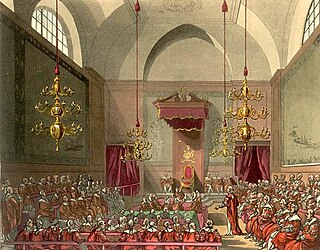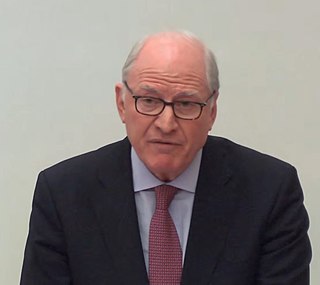Related Research Articles

The House of Lords is the upper house of the Parliament of the United Kingdom. Like the lower house, the House of Commons, it meets in the Palace of Westminster in London, England. One of the oldest institutions in the world, its origins lie in the early 11th century and the emergence of bicameralism in the 13th century.

The House of Commons is the lower house of the Parliament of the United Kingdom. Like the upper house, the House of Lords, it meets in the Palace of Westminster in London, England. The House of Commons is an elected body consisting of 650 members known as members of Parliament (MPs). MPs are elected to represent constituencies by the first-past-the-post system and hold their seats until Parliament is dissolved.
A crossbencher is a minor party member of some legislatures, such as the British House of Lords and the Parliament of Australia. They take their name from the crossbenches, between and perpendicular to the government and opposition benches, where crossbenchers sit in the chamber.

The House of Lords Act 1999 is an Act of the Parliament of the United Kingdom that reformed the House of Lords, one of the chambers of Parliament. The Act was given Royal Assent on 11 November 1999. For centuries, the House of Lords had included several hundred members who inherited their seats ; the Act removed such a right. However, as part of a compromise, the Act did permit ninety-two hereditary peers to remain in the House. Another ten were created life peers to enable them to remain in the House.
John Buttifant Sewel, Baron Sewel,, is a British politician, life peer, and former academic. He served as Chairman of Committees of the House of Lords, its deputy speaker. He is also a former senior vice principal of the University of Aberdeen and a former parliamentary under-secretary of state.

Bruce Bernard Weatherill, Baron Weatherill, was a British Conservative Party politician. He served as Speaker of the House of Commons between 1983 and 1992.
In the United Kingdom, life peers are appointed members of the peerage whose titles cannot be inherited, in contrast to hereditary peers. Life peers are appointed by the monarch on the advice of the prime minister. With the exception of the Dukedom of Edinburgh awarded for life to Prince Edward in 2023, all life peerages conferred since 2009 have been created under the Life Peerages Act 1958 with the rank of baron and entitle their holders to sit and vote in the House of Lords, presuming they meet qualifications such as age and citizenship. The legitimate children of a life peer appointed under the Life Peerages Act 1958 are entitled to style themselves with the prefix "The Honourable", although they cannot inherit the peerage itself. Prior to 2009, life peers of baronial rank could also be so created under the Appellate Jurisdiction Act 1876 for senior judges.

The Lord Speaker of the House of Lords is the presiding officer, chairman and highest authority of the House of Lords in the Parliament of the United Kingdom. The office is analogous to the Speaker of the House of Commons: the Lord Speaker is elected by the members of the House of Lords and is expected to be politically impartial.

The reform of the House of Lords, the upper house of the Parliament of the United Kingdom, has been a topic of discussion in UK politics for more than a century. Multiple governments have attempted reform, beginning with the introduction of the Parliament Act 1911 by the incumbent Liberal Government, which stated:
...whereas it is intended to substitute for the House of Lords as it at present exists a Second Chamber constituted on a popular instead of hereditary basis, but such substitution cannot be immediately brought into operation

Peter Derek Truscott, Baron Truscott is a British petroleum and mining consultant, independent member of the House of Lords and writer. He was a Labour Member of the European Parliament (MEP) from 1994 to 1999 and was elevated to the peerage in 2004. He has written on Russia, defence and energy, and works with a variety of companies in the field of non-renewable resource extraction.

Anthony Stephen Grabiner, Baron Grabiner, KC is a British barrister, academic administrator, and life peer. He is head of chambers at One Essex Court, a leading set of commercial barristers in the Temple, and was the Treasurer of Lincoln's Inn for 2013. From 2014 to 2021 he served as the Master of Clare College, Cambridge and, since 2015, he has served as the President of the University of Law. Grabiner was non-executive chairman of Taveta Investments Ltd, the holding company of Sir Philip Green behind Arcadia Group from 2002 to December 2015.

These are lists of people who belong to non-European ethnic minorities and have been elected as Members of the House of Commons of the United Kingdom, European Union, and other British devolved assemblies and also Members of the non-elected House of Lords.
By-elections to the House of Lords occur when vacancies arise among seats assigned to hereditary peers due to death, resignation, or disqualification. Candidates for these by-elections are limited to holders of hereditary peerages, and their electorates are made up of sitting Lords; in most cases the electorate are those sitting hereditary peers of the same party affiliation as the departed peer.
References
- ↑ "Ineligible Non-affiliated members of the House of Lords". UK Parliament.
- ↑ "The party system". UK Parliament.
MPs and Members of the Lords do not have to belong to a political party. Instead, MPs can sit as Independents and Lords can sit as Crossbenchers or Independents.
- ↑ "The Lord Speaker". UK Parliament.
- ↑ "Non-affiliated members of the House of Lords". UK Parliament.
- ↑ "Three Labour peers quit over handling of antisemitism cases". The Guardian. 9 July 2019.
- ↑ "Oakeshott quits Lib Dems with Clegg 'disaster' warning". BBC News. 28 May 2014.
- ↑ "Lord Paddick to join the Metropolitan Police as a Non Executive Advisor". libdemvoice.org. 10 October 2023.
- ↑ Brown, Faye (17 May 2024). "Kulveer Ranger: Tory peer resigns whip after foul-mouthed drunken outburst at parliament bar". Sky News. Retrieved 17 May 2024.
- ↑ "Labour peer suspended over sexual harassment and transphobia". The Guardian. 23 October 2019.
- ↑ ""Party distances itself from Maginnis gay marriage remarks"". BBC News. 13 June 2012. Retrieved 29 December 2016.
- ↑ Eaton, George (2 March 2014). "David Owen joins Miliband's big tent with donation to Labour of more than £7,500". New Statesman. Retrieved 30 December 2016.
- ↑ "Former Conservative peer Lord Stevens to join UK Independence Party". BBC News. BBC. 18 September 2012. Retrieved 18 September 2012.